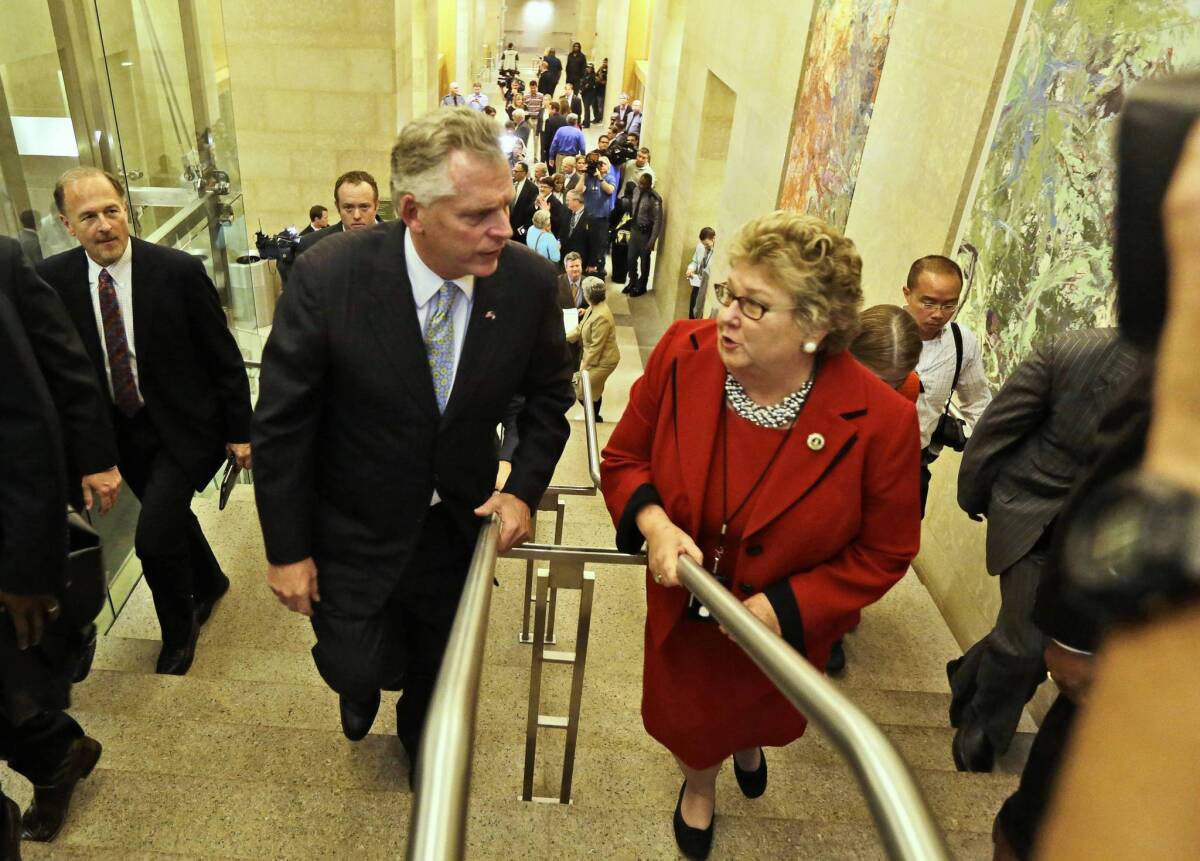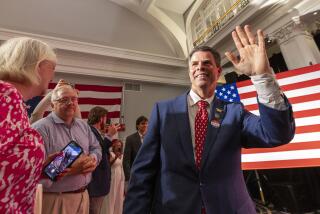In Virginia governor’s race, strategies of both parties fall short

WASHINGTON — The most closely fought major election of the fall, the race for governor of Virginia, has a lesson for both parties: Your magic bullets are duds.
For weeks, partisans on each side have claimed an issue that they argued would sweep their side to victory this year and next. Republicans predicted public anger over Obamacare would power their candidates. On the Democratic side, many said a backlash against the government shutdown would propel their candidates to success.
Virginia, one of the nation’s premier swing states, tested both theories, and both fell somewhat flat.
The healthcare law may have played a role in an apparent tightening of the contest in its final days. “It helped make the race a lot closer” than public surveys had predicted, said Republican pollster Whit Ayres, who is based in the state.
In particular, Republicans who had flirted with a third-party candidate seem to have returned to the fold in the end, allowing the party’s nominee, Ken Cuccinelli, to lose by about 3 percentage points, rather than the wider margin surveys had forecast.
Democrats dispute the tightening theory, saying the public polls simply overstated the lead enjoyed by their candidate, Terry McAuliffe. But even if the healthcare issue did help Cuccinelli consolidate his support, Republicans have to do more than rally their own base to win control of the Senate next year, let alone capture the White House in 2016.
There’s no sign Cuccinelli accomplished that goal; his loss to McAuliffe was almost the same as Mitt Romney’s 4-percentage-point loss of Virginia to President Obama a year ago.
The similarity of the two elections also belied Democratic hopes about the effect of the government shutdown.
Virginia has one of the nation’s highest concentrations of government workers, in the Washington suburbs in the northern part of the state and the military-heavy Hampton Roads area in the south. McAuliffe carried both areas, but his large margins there simply repeated the pattern of Obama’s victory a year ago.
Polls show that the shutdown harmed the Republican Party’s public image, but Virginia shows no evidence of a wave of voter revulsion that might endanger the party’s majority in the House of Representatives.
The fact that neither issue proved decisive was not for lack of trying. On the Republican side, Cuccinelli pounded away at the flaws of the president’s healthcare law throughout the final days of the campaign.
“Tuesday is a referendum on Obamacare,” he declared in the run-up to the election.
PHOTOS: 2013’s memorable political moments
If so, White House officials may be relieved. For two weeks, they’ve been hammered over their inability to build a functioning website to allow people to reliably sign up for coverage and over the cancellation of health insurance policies that fall short of the law’s standards.
The Virginia election could have provided a venue if voters were determined to punish Democratic candidates for those problems. Elections in the state have often been a chance for voters to vent frustrations with the party in power across the Potomac River in Washington. Indeed, McAuliffe’s election marked the first time in 40 years that the party holding the White House had won the Virginia statehouse.
Exit polls showed that a majority of Virginians who voted, 53%, opposed the healthcare law, compared with 46% who supported it. But McAuliffe’s pollster, Geoff Garin, said the campaign’s surveys showed that Cuccinelli’s desire to kill the law, not fix its problems, turned off more voters than it attracted.
“Cuccinelli’s position on Obamacare actually supported what we were saying about him, which is that he was extreme and supported a national tea party agenda,” Garin told the Washington Post.
Democrats, meantime, did their best to tie Cuccinelli to the unpopular government shutdown. McAuliffe pounded the airwaves for weeks with negative ads asserting Cuccinelli’s support for closing down the government; for a time, that strategy appeared to be working. Polls taken during and immediately after the shutdown showed McAuliffe’s lead widening and voters blaming the GOP, not Obama, for the situation.
But if those polls were accurate at the time, public anger faded quickly. In the exit poll, voters divided almost evenly on the question of who was to blame, with 45% pointing to Obama and 48% blaming Republicans in Congress.
None of that means the two issues completely lack political power. A government shutdown next year could test voters’ response anew. And the problems of Obamacare probably will plague Democrats in competitive contests next year.
But, said Ayres, “there are very few magic bullets in politics.”
Twitter: @davidlauter
More to Read
Sign up for Essential California
The most important California stories and recommendations in your inbox every morning.
You may occasionally receive promotional content from the Los Angeles Times.











